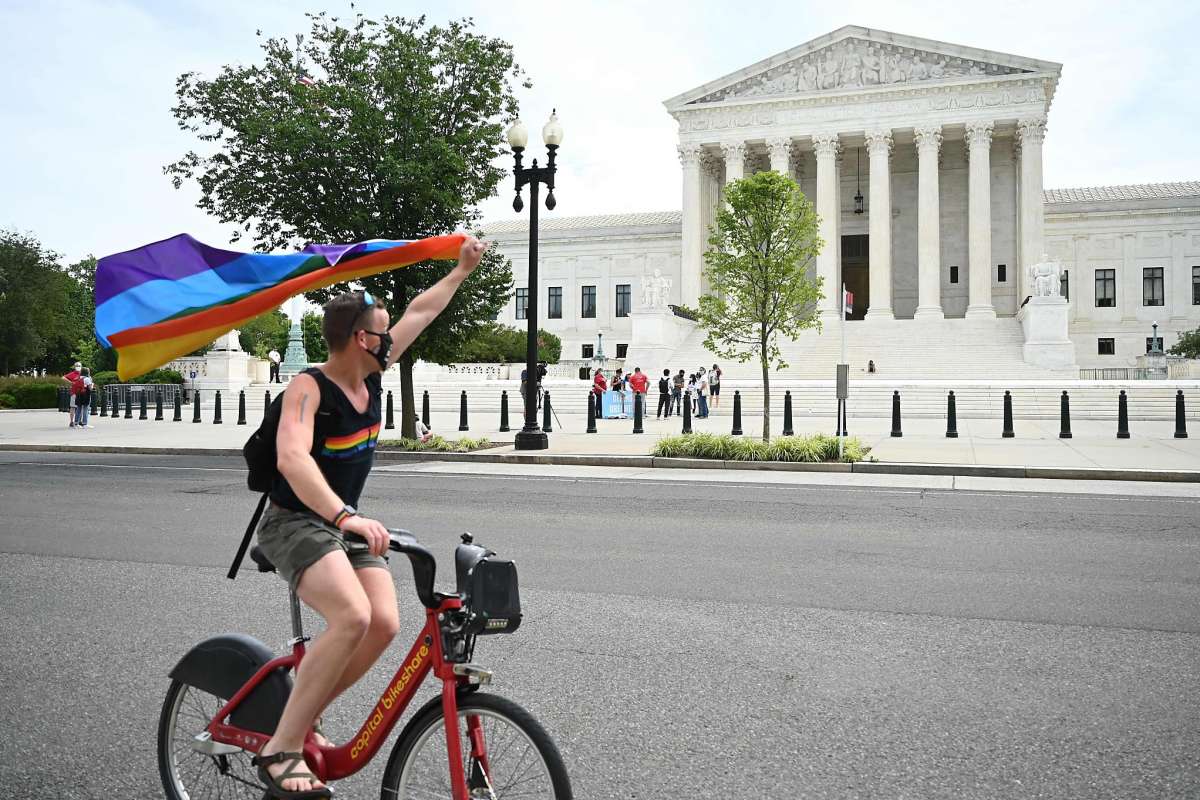Does the right to discriminate trump the right to live freely? Supreme Court Associate Justices Clarence Thomas and Samuel Alito think so.
In 2015, the Supreme Court legalized same-sex marriage nationwide with its ruling in Obergefell v. Hodges. But last Monday, Justices Thomas and Alito denounced that decision and called on the court to “fix” (overturn) it, which is a credible threat as Amy Coney Barrett’s confirmation hearings begin this week.
Thomas and Alito claim that Obergefell violates religious liberty by making it harder for “those with sincerely held religious beliefs concerning marriage … to participate in society.”
Thomas and Alito issued this condemnation specifically while ruling on the case against Kim Davis, a Kentucky county clerk who was sued for refusing on Christian religious grounds to issue same-sex marriage licenses. Calling Davis “a victim of the court’s cavalier treatment of religion in its Obergefell decision,” they take her case as proof that Obergefell disenfranchises people who hold “traditional Christian values.”
By making Kim Davis the face of their “Christians-in-trouble” narrative, Thomas and Alito expose an ugly truth: when they speak about “religious liberty,” they really mean the liberty to commit harm.
The ‘Right to Harm’ LGBTQ People
This “right-to-harm” philosophy is the central but disguised premise behind most anti-LGBTQ backlash: the right-to-harm alleges that straight, religious conservatives deserve to endanger, impoverish, and obstruct LGBTQ lives.
In turn, this right-to-harm contends that religious conservatives are grievously oppressed when they cannot inflict such damage; when they must watch LGBTQ peers freely pursue life, liberty, and happiness.


For religious conservatives, this right-to-harm philosophy demands the right to not only disapprove of LGBTQ people but also (borrowing Thomas and Alito’s own words) to actively block LGBTQ people from “participating in society.”
Kim Davis committed this obstruction by refusing to issue marriage licenses, and Thomas and Alito seek to expand that harm nationwide by delegalizing gay marriage.
This right-to-harm philosophy also fuels the backlash against transgender bathroom access, same-sex adoption, and LGBTQ employment and housing protections: all the legal rights that permit LGBTQ people to pursue their daily lives as straight and cisgender peers do.
Flipping Victim and Aggressor
This right-to-harm philosophy is so insidious because it falsely equates the right to harm with the right to exist. This false equivalence flips victim and aggressor: it aids straight, religious conservatives to cast themselves as violated underdogs even while they actively violate LGBTQ people.
Thomas and Alito exemplify this sleight-of-hand when they claim that Obergefell makes “being a public official with traditional Christian values … legally tantamount to invidious discrimination toward homosexuals,” thus branding “people of good will” like Kim Davis as “bigots.”
This claim ignores how Davis did actively discriminate: she wielded her governmental authority to block gay couples from accessing their marriage rights. Davis’ choice to discriminate is what violated the law, not her existence as a public official with religious beliefs. This choice to discriminate is precisely what Thomas and Alito seek to protect.
However, using the generic terms “rights” or “liberty” helps Thomas, Alito, and their conservative thought community to mask this specific desire to harm others. This phrasing also helps religious conservatives to falsely equate their own right to harm with LGBTQ people’s right to exist at all.
For instance, Thomas and Alito conflate losing the power to obstruct LGBTQ marriages with losing one’s own right to wed. More broadly, the right-to-harm conflates the “pain” of letting LGBTQ people go unabused with the pain of losing one’s own home, job, child, rights, or life to queerphobia.
Twisting the Language of Liberation
By authorizing straight conservatives to attack LGBTQ people “in self-defense,” this right-to-harm philosophy fits into a wider backlash movement called the “identity politics of the dominant.”
The literary scholar Sally Robinson coined this phrase to explain how some white, straight, Christian, and/or male Americans seize language from the Black, feminist, and LGBTQ liberation movements, but twist that language to justify discrimination rather than ending it.
In this “identity politics of the dominant,” groups with the most power misrepresent themselves as America’s imperiled outcasts, allegedly beset by “nasty” women, queers, people of color, Jews, and immigrants.
Indeed, this flipped perception of victim and aggressor has lain at the core of conservative fury these past four years not only against LGBTQ people, but also against immigrants, refugees, and the Black Lives Matter and #MeToo movements.
Many branches of this wider conservative backlash implicitly claim a “right to harm” with impunity in the name of self-defense, as police regularly do to unarmed Black people of all genders.
Unmasking the Right-to-Harm Narrative
Like this wider backlash, the right-to-harm philosophy against LGBTQ people is not new. Back in 2013, the National Organization for Marriage spent $1.5 million on The Gathering Storm, an ad alleging that gay marriage would violate religious liberty. Actors tell the camera, “I’m afraid” that “my freedom will be taken away” by gay advocates aiming to “change the way I live,” like “forcing” a doctor to treat LGBTQ patients.
With this medical example, the ad prioritizes a straight doctor’s right to withhold healthcare — to let a patient suffer or die — over an LGBTQ person’s right to survive. Since The Gathering Storm aired, cases like Kim Davis’s have elevated the right-to-harm philosophy to greater prominence among American religious conservatives as “common sense,” and even (in Thomas and Alito’s view) as a legal imperative.
It is time for lawmakers and laypeople alike to unmask the right-to-harm narrative. When Thomas, Alito, Davis, or anyone else claims that LGBTQ civil rights violate their religious liberty, Americans with more integrity must answer: “You are not defending your right to exist, but claiming a right to harm, and you do not have that right.”

